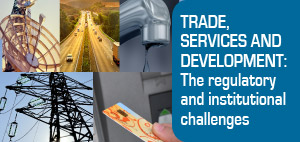 The Doha Mandate, adopted at UNCTAD XIII, stresses that development of services and access to them, supported by adequate regulatory and institutional frameworks, is important for sound socioeconomic development.
The Doha Mandate, adopted at UNCTAD XIII, stresses that development of services and access to them, supported by adequate regulatory and institutional frameworks, is important for sound socioeconomic development.
The objective of the expert meeting is to identify best-fit practices in regard to policymaking, regulations, institutions and trade negotiations, with a view to linking services, trade and development in a balanced manner, including a strengthening of national services regulation without creating trade barriers.
The infrastructure services sectors, which encompass transport, telecommunications, energy and financial services, constitute the backbone of the economy in all countries and contribute directly and indirectly to growth, income generation and better living standards. These sectors also assume an important social function, as access to basic services (including electricity, gas, and safe drinking water), financial inclusion and the bridging of the digital divide, are catalytic to achievement of the Millennium Development Goals. Weak infrastructure services sectors often hamper the development of other services sectors, including tourism, distribution and services relating to information and communications technology, especially in the least developed countries and in small and vulnerable economies.
The first session of the expert meeting will examine cases of building regulatory and institutional competence with a focus on factors leading to success and lessons learned so as to address bottlenecks in building the supply capacity of services in developing countries. This will help to identify best practices in overcoming challenges to regulatory and institutional frameworks with a view to enhancing the provision capacity, efficiency and competitiveness of the infrastructure services sectors.
The issues that experts will address will include the following:
- What is the link between the infrastructure services sectors and other economic sectors, including other services sectors?
- How best can regulations be made conducive to attracting and sustaining investment in infrastructure?
- How should functional criteria for benchmarking the performance of services providers be set?
- How should regulators adapt regulation to changing market conditions and to technological developments?
- What tools should be used to ensure and promote universal access in different infrastructure services sectors?
- What role can regulators play in promoting the industrial development of particular sectors?
- How can regulators exercise independence in decision-making when they are affiliated with a government ministry?
Target participants
Experts to be invited to the multi-year expert meeting will include those from government ministries and agencies dealing with trade, trade negotiations, policymaking and regulations of specific services sectors, research institutions, civil society and the private sector, including coalitions and associations of services industries.
Input from experts Experts nominated by member States are encouraged to submit brief papers (approximately 5–12 pages) as contributions to the work of the meeting. The papers will be made available at the meeting in the form and language in which they are received. They should be submitted to the UNCTAD secretariat in advance of the meeting, and addressed to Ms. Liping Zhang and Ms. Faustina Attobra-Wilson, Palais des Nations, CH-1211, Switzerland; fax: +41 22 917 0044; e-mail: liping.zhang@unctad.org and faustina.attobra-wilson@unctad.org. |


